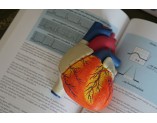Huntington’s Disease
Huntington’s disease is a genetic disorder which affects the central nervous system. Huntington’s disease typically develops in adulthood and can produce a broad range of symptoms.
What is Huntington’s disease?
Huntington's disease is a hereditary brain disorder in which there is no known cure. It is a devastating disease for which there is no current effective treatment. Nerve cells become impaired, causing various parts of the brain to deteriorate. The disease affects behavior, movement and cognition which affects an individual’s ability to think, walk, reason and talk. Ultimately, the person’s motor skills will become almost nonexistent to the point that they become entirely reliant on other people for their care.
Huntington's disease affects patients and their families emotionally, mentally, socially and economically.
Huntington’s disease is caused by a defective gene which produces a protein called Huntingtin and leads to damage of the nerve cells in certain areas of the brain.
A person whose parent has Huntington’s disease has a 50 percent chance of inheriting the defective gene and at some stage, develops the disease. If you know that a family member has previously suffered with Huntington’s disease then be aware that symptoms commonly begin to present themselves between the ages of 30-50 years old, although it can be sooner or later.
Signs and symptoms of Huntington’s disease
Changes in behavior
Changes in a person’s behavior are frequently the first characteristics to appear in Huntington's disease and can be the most distressing. These behavioral changes often include:
- lack of emotion and recognition of the necessities of others
- fluctuating periods of aggression, depression, excitement, indifference, antisocial behavior and anger
- difficulty concentrating or focusing on more than one task at a time
- impulsiveness and irritability
A person suffering from Huntington's disease may seem to have a lack of drive, initiative and concentration, making them appear apathetic. However, this is not the reason, this is how the disease affects the brain and as their condition progresses they may also develop a lack of interest in hygiene and self-care.
Psychological problems
Many people with Huntington's disease develop depression. This occurs as part of the disease, not merely as a response to the diagnosis. Symptoms of depression include a continuous despondent mood, feelings of hopelessness, low self-esteem and a lack of motivation or interest in things.
Some may also develop obsessive behaviors and neurotic problems, although this is relatively rare.
Studies have shown that people with Huntington's disease are more likely to contemplate suicide, mainly near the time of diagnosis when the condition is evident or when they begin to lose their independence.
Problems with mobility
Huntington's disease affects movement functions of a person’s body. Early signs include minor, uncontrollable movements of the face, and twitching or agitated movements of the limbs and body. These eventually shift from one area of the body to another and can cause the person to falter and stumble.
As the disease progresses, the involuntary movements will become more frequent and severe. However, over time this may change and as the disease advances a person's movements may become sluggish and they may develop muscle rigidity.
Nutritional deficiencies
People that develop Huntington's disease tend to suffer from weight loss, despite having a good appetite. They can find eating exhausting, frustrating and difficult because the mouth and throat muscles do not work properly due to loss of motor control. In some severe instances, this can lead to choking and persistent chest infections.
Loss of coordination can lead to drink spills or dropping food and swallowing becomes more difficult.
Difficulties communicating
Communication and reasoning are affected by Huntington's disease.
People with the disease frequently have trouble putting thoughts into words and slur their speech. They can comprehend what's being said, but may not be able to respond or communicate that they understand. But as the disease advances, a person with Huntington's disease will become less responsive, more withdrawn and cease communicating altogether.
When to seek help
By the end stage of the disease, people with Huntington’s require assistance in all aspects of life. They are generally incapable of speaking and remain bedridden. Since it becomes gradually more difficult to care for a patient as the disease progresses, patients often spend the last few years of life in an alternative care facility such as a nursing home, a hospice facility or a residential care home. Nursing homes and hospice facilities provide for extended care in-house, whereas in a residential care home patients will need to employ a hospice or home health care agency or a full time, in-home caregiver. Assisted living facilities are not a good long-term care option for those suffering from Huntington’s disease, as patients require a higher level of care in which these facilities are not licensed to provide.
Choking becomes a primary concern as it becomes exceedingly difficult to swallow. Most late-stage patients require feeding from a tube that is inserted the stomach or small intestine. Many patients have difficulty urinating or become constipated, and some patients suffer from insomnia.
In the last stages of Huntington's disease, the person will be totally dependent and need full nursing care, so it is important to research and interview several facilities or caregivers that are knowledgeable and skilled to manage the care of your loved one.
Add residential care home as an option as well. And that hospice and home health care agencies will visit residential care home to allow for such services to be provided in the residential care homes. Unlike a nursing home or hospice facility where they provide it inhouse. And even with an in home care giver, the agencies will need to be provided in their home as well just like if they were in a residential care facility. Assisted living facility is not an option because it’s higher level of care then they are licensed to provide.









